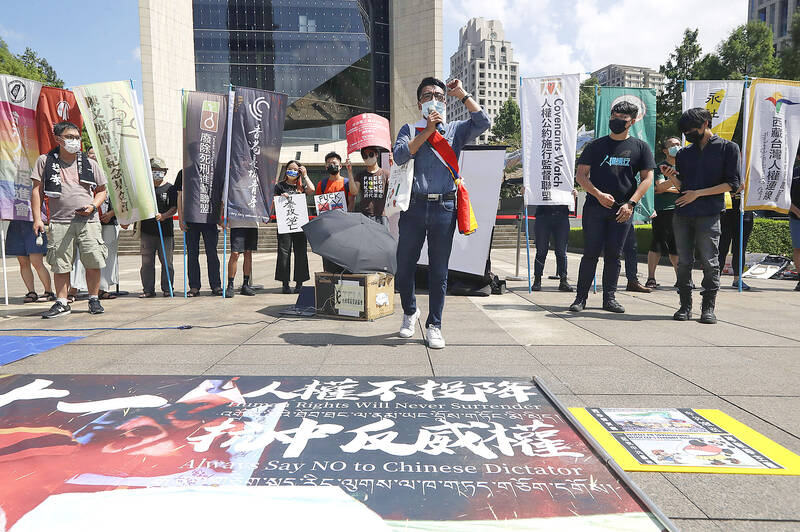Human rights organizations together with Hong Kong, Tibet and Uighur rights advocates rallied in Taipei yesterday, urging people to fight against Chinese aggression, and to petition politicians to safeguard Taiwan’s democracy and not surrender if attacked.
The groups gathered outside the Legislative Yuan in the morning to stage activities ahead of the National Day of the People’s Republic of China today.
Speakers launched a petition to urge politicians to “promise to defend human rights and fight China’s dictatorship,” saying they would ask politicians and lawmakers to sign it in the coming weeks.

Photo: Chiang Ying-ying, AP
Taiwan Association for Human Rights secretary-general Shih Yi-hsiang (施逸翔) said the petition comprises three calls to action: to safeguard human rights; defend Taiwan’s freedom and not surrender if attacked by China; and join forces to counter Chinese expansionism.
Shih said that the allied groups plan to approach politicians and lawmakers across party lines, including candidates running in the local elections, and on Human Rights Day, Dec. 12, would reveal who did and did not sign the petition.
“Taiwan has continued to implement and uphold the values of human rights, in sharp contrast to what is happening in China. Defending human rights is also to defend Taiwan against Chinese military intimidation,” Shih said.
“In Taiwan, we have a vibrant democracy and people can enjoy freedom. These are the strongest weapons against China’s threat of force,” he said.
Human Rights Network for Tibet and Taiwan executive member Tashi Tsering (札西慈仁) said that China has for decades repressed and subjugated Tibetan people, committing atrocities and breaching human rights.
“Although Beijing proclaims to the world that it protects the rights of ethnic minorities, the conditions in Tibet are terrible, as Chinese policies are focused on eradicating the Tibetan people’s culture, language and religion,” Tashi Tsering said.
Hong Kong Outlanders secretary-general Sky Fung (馮詔天) said China is imposing increasing restrictions to phase out freedom and democracy in the territory.
“We must stand up together to work with pro-democracy forces,” he said. “We still have a choice, we must say ‘no’ to Chinese dictatorship, we must choose to fight against China and to never surrender.”
At about noon, the gathering headed to the Bank of China head office near the Taipei City Government building for a brief speech and presentation by members of the Economic Democracy Union, Taiwan East Turkistan Association, Judicial Reform Foundation, Taiwan Forever Association, Taiwan Labor Front, Taiwan Tibetan Welfare Association and Covenants Watch of Taiwan, among others.
“China has continued its military maneuvers to intimidate Taiwan, taking up devious means to curtail Taiwan’s participation on international forums. Its disinformation and political propaganda campaigns create division and social strife in Taiwan, aimed at pushing for political extremism and conflict,” the groups said in a joint statement.
“China is providing financial support to their proxies to infiltrate all sectors of Taiwanese society to promote defeatist talk, for surrender to China,” it said.
“We must fight against such dissemination of Chinese propaganda and disinformation, and to stop any politicians from promoting surrender in the guise of ‘peaceful unification,’ and work to cut off Chinese money entering Taiwan to fund for activities by their proxies,” the statement said.

Taiwanese can file complaints with the Tourism Administration to report travel agencies if their activities caused termination of a person’s citizenship, Mainland Affairs Council Minister Chiu Chui-cheng (邱垂正) said yesterday, after a podcaster highlighted a case in which a person’s citizenship was canceled for receiving a single-use Chinese passport to enter Russia. The council is aware of incidents in which people who signed up through Chinese travel agencies for tours of Russia were told they could obtain Russian visas and fast-track border clearance, Chiu told reporters on the sidelines of an event in Taipei. However, the travel agencies actually applied

Japanese footwear brand Onitsuka Tiger today issued a public apology and said it has suspended an employee amid allegations that the staff member discriminated against a Vietnamese customer at its Taipei 101 store. Posting on the social media platform Threads yesterday, a user said that an employee at the store said that “those shoes are very expensive” when her friend, who is a migrant worker from Vietnam, asked for assistance. The employee then ignored her until she asked again, to which she replied: "We don't have a size 37." The post had amassed nearly 26,000 likes and 916 comments as of this

New measures aimed at making Taiwan more attractive to foreign professionals came into effect this month, the National Development Council said yesterday. Among the changes, international students at Taiwanese universities would be able to work in Taiwan without a work permit in the two years after they graduate, explainer materials provided by the council said. In addition, foreign nationals who graduated from one of the world’s top 200 universities within the past five years can also apply for a two-year open work permit. Previously, those graduates would have needed to apply for a work permit using point-based criteria or have a Taiwanese company

The Shilin District Prosecutors’ Office yesterday indicted two Taiwanese and issued a wanted notice for Pete Liu (劉作虎), founder of Shenzhen-based smartphone manufacturer OnePlus Technology Co (萬普拉斯科技), for allegedly contravening the Act Governing Relations Between the People of the Taiwan Area and the Mainland Area (臺灣地區與大陸地區人民關係條例) by poaching 70 engineers in Taiwan. Liu allegedly traveled to Taiwan at the end of 2014 and met with a Taiwanese man surnamed Lin (林) to discuss establishing a mobile software research and development (R&D) team in Taiwan, prosecutors said. Without approval from the government, Lin, following Liu’s instructions, recruited more than 70 software